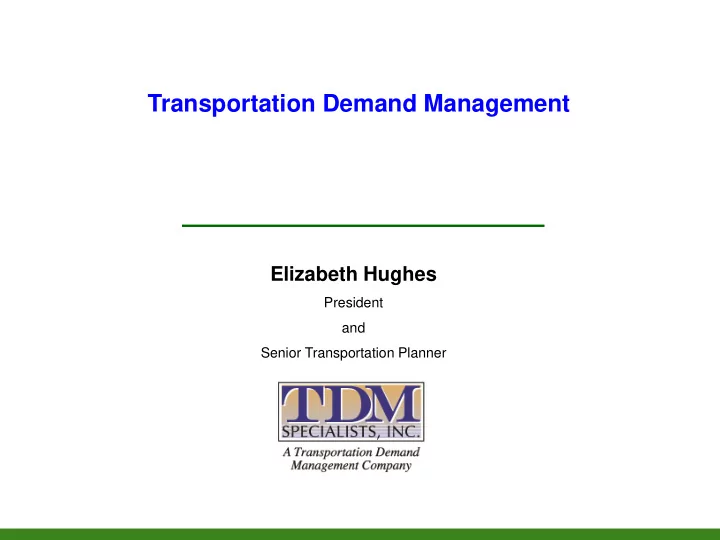

Transportation Demand Management Elizabeth Hughes President and Senior Transportation Planner
What is it? TDM Overview What is Transportation Demand Management (TDM)? Transportation Systems Management (TSM) • Vehicle Trip Reduction/Mitigation • Car Management Strategies • Parking Management/Parking Demand Reduction • Commuter Programs •
What is it? TDM Overview Utilization of existing transportation resources • Convert or shift SOV trips to alternative modes (transit, carpools or vanpools, bicycling or walking) • Reduce vehicle trips (trip link, shop local, avoid peak-hour traffic periods or congested routes) • Eliminate vehicle trips (compressed work weeks, teleconference or telecommute)
TDM Overview How it’s done 1. Infrastructure and physical measures Showers, carpool parking spaces, transportation kiosks, bicycle facilities, bus shelters and/or land dedication for bus shelters, etc. 2. Outreach and program management Carpool matching, transportation materials, transit subsidies, trip planning, emergency ride home program, vanpool programs, shuttles, car-sharing, rideshare promotions and events, etc. 3. Monitoring Performance measurements, employee commute survey and reporting, etc.
State Your Goal TDM Overview Successful TDM/commute programs… Improve • Retention of Key Staff • Competitive Recruitment • Employee Wellness/Quality of Life/Air Quality • Contributes to Corp Accelerating Sustainability impact • The triple bottom line (profit, people, planet) Reduce • Single Occupant Vehicle (SOV) trips • Demand for Parking • The carbon footprint, greenhouse gases • Employee turnover
A well-performing commuter program supports a working environment that promotes clean, eco- friendly commute options for employees.
TDM Applications Required • Building permits • Environmental mitigation • Increased occupancy/density request • SB 1339 Regional Commuter Benefit Voluntary • Parking constraints • Workforce competition • Employee need/demand • Environmental goals
Hurdles to Success • Too many carrots, not enough sticks • Lack of corporate buy-in (philosophical embracement) • Lack of executive-level champion • Lack of planning • Lack of dedicated funding • Lack of employee outreach and promotions • Lack of employee engagement
Hurdles to Success Carrots and Sticks “Losses or punishments had a measured impact two to three times greater than gains or rewards.” 1 “There are no carrots for other modes that can overcome the powerful determinism of free employer car parking.” 2 Carpool example: 1. Carpool parking spaces are provided in preferential locations 2. Carpool parking spaces require registration and permit 3. Carpool spaces are “reserved/assigned” 4. Carpool commuters receive incentives 5. Carpool commuters receive financial allowances 6. Parking is charged at work, but made free to carpoolers 1) https://source.wustl.edu/2015/05/carrot-or-stick-punishments-may-guide-behavior-more-effectively-than-rewards/ 2) Commuter Mode Choice and Free Car Parking, Public Transportation Benefits, Showers/Lockers, and Bike Parking at Work: Evidence from the Washington DC Region, Andrea Hamre and Ralph Buehler, Virginia Tech, Journal of Public Transportation, Vol. 17, No. 2, 2014.
Performance Proof South San Francisco TDM Ordinance-stipulated Survey Methodology Alternative Transportation Mode-Use Rate* Britannia Oyster Point I Year Rigel Amgen Calico (Aggregate Data) 2004** 14.4% 20.0% 17.60% 2005** 36.3% 23.8% 25.70% 2006** 50.6% 21.7% 28.90% 2007** 49.0% 24.6% 31.15% 2008** 52.6% 30.7% 37.07% 2009** 33.7% 30.3% 31.20% 2010 30.2% 25.7% 26.74% 2011 30.2% 26.0% 26.50% 2012 28.0% 43.8% 38.73% 2013 28.9% 40.9% 37.98% 2014 31.2% 35.0% 34.16% 2015*** 25.9% 48.6% 20.7% 38.70% Notes: * All alternative mode-use rates are calculated assuming traditional non-respondents as SOV. ** Carpool data may have included "carpool with children" and commuter carpool results may have been overstated. *** Due to low response rate, Amgen data was adjusted according to the City's 2010 revised Zoning Ordinance and the campus mode-use rate reflects a hybrid rate.
How Does TDM Supports HR? Commuter benefits aid recruitment and retention efforts – contributes to being an “employer of choice” Commuter benefits are low-cost compared with other benefits – e.g., pre-tax programs
TDM Resources Association for Commuter Transportation (ACT) Back to Basics Workshop: November 29, at Stanford University Best Workplaces for Commuters (BWC) • Help Desk – over 500 FAQs and case studies • Business Benefits Calculator • Commuter Benefit Briefs • Emergency Ride Home Toolkit • Qualified Transportation Fringe Benefits • Survey Guide – how to conduct an employee survey An Independent Research organization dedicated to developing innovative and practical solutions to transportation problems.”
TDM Measures Employer Programmatic TDM Measures (Basic) • Kick-off commuter event or campaign • Commuter resource web portal/commute flier • On-site bike program for daytime use • Emergency Ride Home program • Designated Employee Commute Coordinator (outsourced or internal) • Promotional programs (Bike to Work Day, etc.), e-newsletters, etc. • Carpool matching resources and promotions • Bicycle route mapping and resources • Transit trip planning and resources • New employee hire – commuter resource materials • Free trial transit passes for new riders • Pre-tax payroll option for transit or vanpool
TDM Measures Other TDM Measures (Better) • Transit and vanpool subsidies (up to $255 per month) • Carpool, bike and pedestrian commuter cash allowances (taxable) • “Reserved” carpool parking program (with permits) • Carpool/vanpool incentive programs (fuel cards, FasTrak, rewards) • Internal, private social network for carpool matching (Zimride/Scoop) • Bicycle Fixit station • Establish Company Bike Club • Flextime/off-peak commuting • Teleworking/telecommuting • Dedicated peak-hour last-mile station shuttles • On-site carshare program (employee paid) • Employee carshare membership funded by employer
TDM Measures Other TDM Measures (Best): • Free VTA ECO Pass • Free Caltrain GO Pass • Free company-sponsored vanpool program (lease, fuel, insurance, FasTrak) • Dedicated commuter shuttle program (long-haul) • Dedicated on-site carshare program funded by employer
QUESTIONS? Elizabeth L. Hughes President Senior Transportation Planner 408-420-2411 (Direct) Elizabeth.Hughes@tdmspecialists.com
Recommend
More recommend